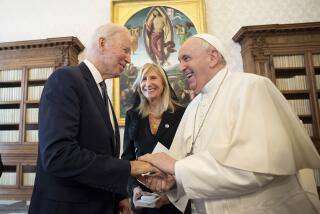‘Bishops and Economics’
I was dismayed by the wave of criticism of the second draft of the National Conference of Catholic Bishops’ pastoral letter on the U.S. economy. Most of the negative comments reflect hasty reading of the draft, if even that.
The draft does not accuse us of wholesale neglect of poverty; it praises past successes in this area. It doesn’t condemn free enterprise, or come close to embracing socialism; it gives free enterprise qualified but enthusiastic credit as part of our bold experiment in democracy. It doesn’t see government intervention as the cure, but only as part of a larger cure, which involves the cooperation of all.
It seeks not a lifetime of handouts to make people dependent, but creative programs to help the poor get on their feet and contribute their talents to our economy. It doesn’t advocate equality in the distribution of wealth; it does insist on minimal resources to help the poor survive and build for themselves a better life.
Didn’t anyone actually read the draft?
What dismays me even more is the shock of the letter writers who identified themselves as Catholics. Why is all this a surprise to them? The development of an economic ethic that protects human dignity, at the expense of raw economic power if necessary, is a concept we inherited from our Jewish brothers and sisters and have made our own through the ages, from the writings of the ancient church fathers to pronouncements by the most recent century of popes. The draft makes clear the biblical basis of this ethic.
We Catholics are not always successful in teaching our traditions to our own people. When our own ignorance of our heritage spills over into letters to The Times, it becomes painfully embarrassing to all of us.
WILLIAM J. EVANS
Irvine
More to Read
Get the L.A. Times Politics newsletter
Deeply reported insights into legislation, politics and policy from Sacramento, Washington and beyond. In your inbox three times per week.
You may occasionally receive promotional content from the Los Angeles Times.










